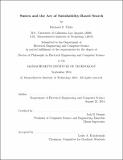Smten and the art of satisfiability-based search
Author(s)
Uhler, Richard Stephen
DownloadFull printable version (846.7Kb)
Other Contributors
Massachusetts Institute of Technology. Department of Electrical Engineering and Computer Science.
Advisor
Jack B. Dennis.
Terms of use
Metadata
Show full item recordAbstract
Satisfiability (SAT) and Satisfiability Modulo Theories (SMT) have been leveraged in solving a wide variety of important and challenging combinatorial search problems, including automatic test generation, logic synthesis, model checking, program synthesis, and software verification. Though in principle SAT and SMT solvers simplify the task of developing practical solutions to these hard combinatorial search problems, in practice developing an application that effectively uses a SAT or SMT solver can be a daunting task. SAT and SMT solvers have limited support, if any, for queries described using the wide array of features developers rely on for describing their programs: procedure calls, loops, recursion, user-defined data types, recursively defined data types, and other mechanisms for abstraction, encapsulation, and modularity. As a consequence, developers cannot rely solely on the sophistication of SAT and SMT solvers to efficiently solve their queries; they must also optimize their own orchestration and construction of queries. This thesis presents Smten, a search primitive based on SAT and SMT that supports all the features of a modern, general purpose functional programming language. Smten exposes a simple yet powerful search interface for the Haskell programming language that accepts user-level constraints directly. We address the challenges of supporting general purpose, Turing-complete computation in search descriptions, and provide an approach for eciently evaluating Smten search using SAT and SMT solvers. We show that applications developed using Smten require significantly fewer lines of code and less developer effort for results comparable to standard SMT-based tools.
Description
Thesis: Ph. D., Massachusetts Institute of Technology, Department of Electrical Engineering and Computer Science, 2014. This electronic version was submitted by the student author. The certified thesis is available in the Institute Archives and Special Collections. Cataloged from student-submitted PDF version of thesis. Includes bibliographical references (pages 177-182).
Date issued
2014Department
Massachusetts Institute of Technology. Department of Electrical Engineering and Computer SciencePublisher
Massachusetts Institute of Technology
Keywords
Electrical Engineering and Computer Science.